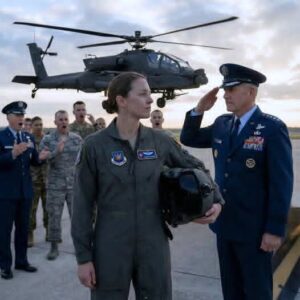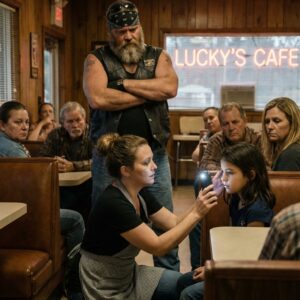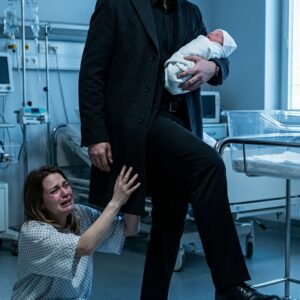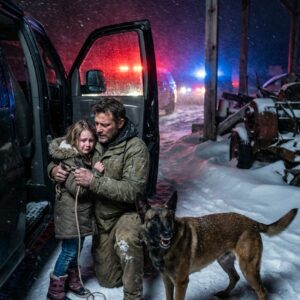The school bell chimed across the playground of Oakwood Elementary, its familiar ring signaling the end of another lunch period. I, Rebecca Collins, stood by my classroom door, watching my second-grade students file back in from the cafeteria with the lingering scent of chocolate milk and peanut butter sandwiches trailing behind them. My eyes narrowed slightly as I counted heads. Nineteen, twenty, twenty-one… one missing. Lily Parker. Again.
I glanced at my watch. This was the third time this week that Lily had failed to return with the others. On the previous occasions, I had found her in the library, claiming she’d lost track of time while reading. But I knew better. The librarian had confirmed that Lily hadn’t been there yesterday.
“Katie, would you please lead the class in silent reading until I return?” I asked my classroom helper, a responsible girl with tortoise-shell glasses who beamed at the responsibility.
“Yes, Miss Collins!” Katie replied with the enthusiasm only a seven-year-old granted temporary authority could muster.
I stepped into the hallway, my sensible navy flats tapping against the polished linoleum. The late October chill had begun to seep through the school’s aging windows, and I pulled my cardigan tighter around my slender frame. Three years of widowhood had left me with an instinctive awareness of absence, a sixth sense for when something wasn’t quite right. And something definitely wasn’t right with Lily Parker.
I scanned the hallway, checking the girls’ bathroom and the water fountain alcove before heading toward the cafeteria. The lunch ladies were already cleaning up, industrial-sized mops slapping wetly against the floor.
“Marjorie, have you seen Lily Parker? Dark hair, usually wears a purple backpack?”
The cafeteria manager shook her head. “That little one with the big eyes? Haven’t seen her since the lunch bell. Come to think of it, haven’t seen her eat much lately, either.”
I frowned. “What do you mean?”
“She comes through the line, takes her tray, but I don’t think she’s eating. Just sits there, pushing food around.” Marjorie leaned on her mop. “Thought you teachers were supposed to notice these things.”
I felt a prick of guilt. I had noticed, of course I had. But I’d attributed Lily’s behavioral changes to something else, something more common: a new sibling rivalry, perhaps, or parents fighting—the usual disruptions of childhood.
Outside, the playground was nearly empty. I shielded my eyes against the autumn sun, scanning the play structures, the tetherball poles, the painted hopscotch squares. No Lily. I was about to turn back when a flash of purple caught my eye—the corner of a backpack disappearing around the edge of the building, toward the wooded area that bordered the school property. My heart quickened. Students weren’t allowed in that area unsupervised.
I hurried across the asphalt, my teacher’s intuition warring with my desire not to overreact. Lily had always been one of my best students—diligent, bright, eager to please. Until recently.
As I rounded the corner, I slowed my pace, not wanting to startle the child. I saw Lily about fifty yards ahead, making her way along a narrow dirt path that wound between the maple trees. She moved with purpose, her purple backpack bouncing against her small frame. I hesitated. Following a student off school grounds without alerting anyone wasn’t protocol, but neither was allowing a seven-year-old to wander into the woods alone. I pulled out my phone, quickly texting the school secretary: Checking on Lily Parker behind the school. Back in 10 minutes.
I kept my distance, staying just close enough to keep Lily’s purple backpack in sight through the trees. The woods weren’t deep, just a small buffer between the school and the residential neighborhood beyond, but they were thick enough that I soon lost sight of the school building. The girl stopped beside a large oak tree and glanced around furtively before kneeling down and unzipping her backpack. I ducked behind a tree trunk, feeling oddly like an intruder.
From my hiding spot, I watched as Lily removed her lunchbox and opened it carefully. Inside was the standard lunch I’d seen her pack away, untouched, day after day: a sandwich, an apple, a small bag of carrot sticks, and what looked like a pudding cup. I felt a heaviness in my chest. Was Lily struggling with some kind of eating disorder at seven? Lily repacked the lunchbox, zipped it into a smaller front pocket of the backpack, and continued down the path.
I followed, my concern deepening with each step. After another minute, the trees thinned out, revealing a small clearing beside a creek that ran along the edge of the property. I stopped abruptly at the edge of the clearing, my hand flying to my mouth.
There, nestled against the embankment, was a makeshift shelter constructed of tarps, an old tent, and what appeared to be salvaged building materials. A man sat on an overturned milk crate, his head in his hands. Beside him, a small boy of about four slept on a tattered sleeping bag, his face flushed and sweaty despite the cool air.
“Daddy?” Lily’s voice carried across the clearing. “I brought lunch. Is Noah feeling any better?”
The man looked up, and I was struck by the deep circles under his eyes, the several days’ worth of stubble on his hollow cheeks. Despite his disheveled appearance, there was something in the shape of his face, the set of his shoulders, that spoke of someone unaccustomed to such circumstances.
“Hey, pumpkin,” he said, his voice a hoarse whisper. “He’s still got a fever. I’ve been giving him Tylenol, but we’re almost out.”
Lily approached him, unzipping the front pocket of her backpack. “I brought my lunch. And look, they had chocolate pudding today!” She held it out like a precious gift.
The man’s face crumpled slightly before he composed himself. “That’s great, sweetie, but you should eat that. You need your strength for school.”
“I’m not hungry,” Lily insisted. “And Noah likes pudding. Maybe it’ll make him feel better.”
“Lily,” the man said gently. “You’ve been saying you’re not hungry for two weeks now. You need to eat.”
I couldn’t stay hidden any longer.
I stepped into the clearing, leaves crunching beneath my feet.
“Lily?”
The girl whirled around, her face draining of color. The man jumped to his feet, instinctively moving between the stranger and the sleeping boy.
“Miss Collins,” Lily’s voice was barely audible. “I… I was just…”
“It’s okay, Lily,” I said, keeping my voice calm despite the shock and questions whirling through my mind. I turned to the man. “I’m Rebecca Collins, Lily’s teacher.”
The man regarded me wearily, his body tense. Up close, I could see that his clothes, though dirty, were once of good quality. His watch looked expensive, though it seemed to have stopped.
“Daniel Parker,” he finally said. “Lily’s father.”
I glanced at the sleeping boy, noting his flushed cheeks and labored breathing. “And that’s my son, Noah,” Daniel answered, his voice tight with defensiveness and something else—shame. “My younger son.”
A heavy silence fell between us, broken only by the soft babbling of the creek and Noah’s congested breathing.
“Lily’s been bringing you her lunches,” I said. It wasn’t a question.
Daniel closed his eyes briefly. “I’ve told her not to. I’ve told her she needs to eat.”
“Daddy needs it more,” Lily piped up. “And Noah, too. I can eat when I get home.”
“When you get home?” I repeated softly, looking around at the makeshift shelter. “Is this home now?”
Daniel’s jaw tightened. He looked at Lily and then at Noah before meeting my gaze. “For the time being. It’s temporary.”
My mind raced through possibilities, protocols, proper channels. But all I could focus on was the labored breathing of the little boy on the sleeping bag. “How long has Noah been sick?” I asked.
“Three days,” Daniel answered. “It started as a cold, but the fever won’t break. I’ve been giving him children’s Tylenol, keeping him hydrated as best I can.”
I moved closer to look at the child. His cheeks were scarlet against the pallor of his face, his breathing uneven. I placed a hand on his forehead and felt the heat radiating from his skin.
“He needs medical attention,” I said firmly. “This isn’t just a cold.”
“We don’t have insurance anymore,” Daniel said, his voice cracking. “I can’t—”
“Daddy, is Noah going to be okay?” Lily asked, her small face pinched with worry.
Daniel knelt beside his daughter, placing his hands on her shoulders. “Of course he is, pumpkin. He just needs rest, that’s all.”
I watched the interaction, noting the gentle way Daniel handled his daughter despite his own obvious exhaustion. This wasn’t neglect, at least not willful neglect. This was desperation.
“Mr. Parker,” I said quietly. “Noah needs to see a doctor. I’m going to call for help.”
Panic flashed across Daniel’s face. “Please, don’t. They’ll take them away from me. I can’t… they’re all I have left.”
My heart constricted at the raw fear in his voice. “Who will take them away?”
“Child Services, the state.” He ran a hand through his unkempt hair. “We lost our house. Emma… my wife… she died six months ago. A heart condition. The medical bills, the funeral costs… I fell behind, way behind. But I’m trying. I’ve been looking for work, but it’s hard with Noah, and the shelters won’t take a single father with kids, or they’re full, or…” He broke off, seeming to realize he was rambling. “Please,” he said. “We just need a little more time.”
I looked at Noah again, at his flushed face and chapped lips. Then at Lily, thin and pale, dark circles under her eyes belying her claim that she ate at home. There was no home.
“Noah needs help now,” I said firmly. “I understand you’re afraid, but his health has to come first.”
Daniel’s shoulders slumped. “They’ll separate us.”
“I’ll do everything I can to prevent that,” I promised, surprising myself with my own certainty. “But right now, Noah needs medical care that you can’t provide here.”
I pulled out my phone, moved slightly away, and dialed 911. As I gave the dispatcher details of their location and Noah’s condition, I watched Daniel kneel beside his son, gently stroking the boy’s hair with a trembling hand.
“They’re sending an ambulance,” I said when I ended the call. “They’ll be here in a few minutes.”
Daniel nodded, resignation replacing the panic in his eyes. “Thank you… for caring about Noah,” he said quietly. “And for looking out for Lily at school. She thinks the world of you.”
Lily had moved to sit beside her father, her small hand wrapped in his larger one. The sight sent an unexpected pang through my chest. It had been three years since my husband John’s death, three years since I’d felt that particular kind of connection, the unspoken understanding between people who shared a life, who protected each other.
Paramedics emerged from the trees, guided by a school security guard. I stepped forward to intercept them, briefly explaining the situation while keeping the details of the family’s circumstances vague. Two paramedics immediately went to Noah, checking his vitals while asking Daniel questions. The third radioed in their findings, his expression grim as he reported the child’s temperature: 104.2.
“We need to transport him now,” the lead paramedic said. “Dad, you can ride with us.”
“My daughter…” Daniel began.
“I’ll bring Lily to the hospital,” I offered quickly. “If that’s okay with you.”
Relief washed over Daniel’s face. “Thank you.”
As the paramedics transferred Noah to a stretcher, I noticed the school security guard speaking into his radio, his eyes scanning the makeshift shelter. I knew what would happen next. Reports would be filed, authorities notified, the school principal would have questions. But watching Daniel climb into the ambulance beside his son’s stretcher, Lily’s small hand clutched in his, I knew I’d made the right choice. Protocol existed for a reason, but sometimes, humanity had to come first.
“I’ll meet you at Memorial,” I called as the ambulance doors closed. Only then did I turn to face the security guard, whose expression wavered between confusion and concern.
“Miss Collins,” he began. “Principal Washburn is asking for you to report to her office immediately.”
I nodded, already walking back toward the school. “I’ll speak with her after I take Lily to the hospital.”
“But the principal said—”
“Tell her I’m fulfilling my duty of care to a student,” I interrupted, surprised by my own assertiveness. “I’ll explain everything later.”
As I guided Lily through the woods, her purple backpack bobbing ahead of me, I tried to process what I had discovered. A family shattered by loss and circumstance, a father doing everything he could to keep his children safe and educated despite unimaginable hardship, and a little girl who had been silently going hungry to feed her family, carrying a burden no child should bear.
“Miss Collins?” Lily’s voice broke through my thoughts. “Are they going to take Noah and Daddy away from me?”
I stopped, kneeling down to look directly into the child’s worried eyes. “I’m going to do everything I can to keep your family together,” I promised. “Everything.”
Only later would I realize the magnitude of that promise and how it would change all our lives forever.
The antiseptic smell of Memorial Hospital’s emergency department burned my nostrils as I guided Lily through the automatic doors.
“I don’t like hospitals,” Lily whispered, her eyes darting nervously around the crowded waiting room.
I squeezed her shoulder gently. “I know, sweetie. I don’t either.” I didn’t elaborate on my own reasons: the long, terrible nights sitting beside John’s bed, watching chemotherapy drip into his veins; the way his once-robust frame had withered; the moment when the monitors flatlined and the room filled with a cacophony of alarms and voices that somehow still felt like the deepest silence I’d ever known.
We found Daniel standing beside a hospital bed in Pediatrics, Room 412. Noah lay small and pale against the white sheets, an IV in his arm and monitors attached to his chest. A doctor was speaking to Daniel in low tones.
“This is Miss Collins,” Daniel explained. “Lily’s teacher.”
“Dr. Patel,” the doctor said, shaking my hand. “I was just explaining to Mr. Parker that Noah has pneumonia. It’s progressed to a concerning degree. We’ve started him on IV antibiotics and fluids for the dehydration.”
“Will he be all right?”
“Children are remarkably resilient,” Dr. Patel said, a non-answer that I recognized from my own days sitting beside John’s hospital bed. “We’ve caught it in time to prevent serious complications, but he’ll need to remain hospitalized for at least a few days.”
After the doctor left, an uncomfortable silence fell, broken only by the steady beeping of Noah’s monitors.
“Thank you,” Daniel said suddenly, his voice rough with emotion. “For following her, for calling the ambulance. I was so afraid of the consequences that I couldn’t see how sick he really was.”
“Any teacher would have done the same,” I demurred.
Daniel shook his head. “No. Most would have reported us to authorities without getting involved. You stayed. You’re still here.”
I had no answer for that. He was right. I should have simply alerted the school administration and let the proper channels take over. Instead, I’d inserted myself directly into this family’s crisis. The question was, why?
The door opened and a woman in a navy suit entered. “Mr. Parker? I’m Vanessa Morales, from hospital social services.” Her practiced smile included both of us. “I understand you have some housing insecurity issues that may have contributed to your son’s condition.”
Daniel’s posture stiffened. “My son got sick because children get sick, not because we’re temporarily displaced.”
“Of course,” Vanessa’s professional demeanor didn’t waver. “But living outdoors can exacerbate health conditions.” She glanced at her file. “I am obligated to report this situation to Child Protective Services. Living outdoors with minor children, especially heading into winter, is considered potentially endangering.”
Daniel’s hands clenched. “I’ve done everything possible to keep them safe.”
“Your son has pneumonia,” Vanessa pointed out, not unkindly. “And it appears you’ve been relying on your daughter’s school lunches for food.”
“That’s not entirely fair,” I stepped forward. “Mr. Parker has been doing his best in an impossible situation.”
Vanessa turned her attention to me. “And you are?”
“Rebecca Collins. I’m Lily’s teacher.”
“I see,” Vanessa made a note. “And is it standard practice for teachers to accompany students to the hospital?”
I felt my cheeks warm. “No, but I promised Lily I’d bring her to see her brother.”
“Miss Collins found us,” Daniel explained.
Vanessa’s lips pressed into a thin line. “As a mandated reporter, you’re obligated to—”
“I’m aware of my obligations,” I interrupted. “I’ve been teaching for twelve years.”
The tension was broken by Lily’s small voice. “Are you going to take us away from Daddy?”
Vanessa hesitated. “Well, I—”
“No one is taking you anywhere right now,” I interjected firmly. “Your dad is right here, and Noah is getting the care he needs.” I shot Vanessa a look that clearly communicated she had overstepped. We stepped outside for a moment.
“I understand you care about your student,” she said, keeping her voice low. “But you can’t make promises like that. The reality is that temporary placement in foster care may be necessary while Mr. Parker secures stable housing.”
“He lost his wife six months ago,” I countered. “Separating him from his children now would be needlessly traumatic.”
“My obligation is to ensure those children are safe.”
“They’re safer with their father than with strangers,” I insisted. “He’s not neglectful or abusive. He’s desperate.”
Vanessa sighed. “Look, I can see you care. But there are boundaries for a reason. Proper channels exist to protect everyone, including you.”
“I’m not concerned about protecting myself,” I said. “I’m concerned about a family that’s already been through hell losing each other because of bureaucracy.”
Vanessa regarded me silently for a moment. “I’ll make some calls, see if we can get the Parkers emergency housing together. But I can’t promise anything, and I still have to file a report with CPS. That’s non-negotiable.”
I arrived at Oakwood Elementary at precisely 6:55 AM, steeling myself for the meeting with Principal Washburn. She sat behind her imposing desk, her expression thunderous.
“Rebecca,” she said, not bothering with pleasantries. “Close the door and sit down.” She proceeded to list my breaches of protocol: leaving school property, failing to notify administration, inserting myself into a family’s personal situation.
“With all due respect, Patricia,” I finally said, “Noah Parker needed immediate medical attention. He could have died if I’d waited to file paperwork.”
“That’s hyperbole,” she dismissed. “And it doesn’t excuse the breach. The superintendent has been notified. The school board will need to be briefed.” She paused. “And I’ve received a call this morning from Child Protective Services. They expressed concern about your level of involvement.”
“I promised to help them,” I clarified.
Principal Washburn’s eyebrows rose. “You are this child’s teacher, nothing more.”
“Those systems don’t always protect, Patricia,” I said, unable to keep the emotion from my voice. “Sometimes they cause more harm than good.”
“So what happens now?” I asked, my voice tight.
Principal Washburn slid a folder across her desk. “I’m issuing a formal written warning for your breach of protocol. And Lily… she’s being assigned to Miss Peterson’s class, effective immediately.”
“What?” Shock coursed through me. “You’re removing her from my class?”
“Given your inappropriate level of involvement, it’s the only prudent course of action. It creates a clear conflict of interest.”
“She trusts me. After everything she’s been through, you’re going to force her to adjust to a new teacher, too?”
“Perhaps you should have considered that before inserting yourself so deeply into her family’s personal matters,” Principal Washburn’s tone was final. “The decision has been made.”
As I reached the door, she added, “I’d advise you to be very careful about your continued involvement. Your position here could be jeopardized.” The threat hung in the air between us.
“I’m recommending temporary placement of both children in emergency foster care,” said Jade Wilson, the CPS caseworker, in the hospital hallway.
Though I had expected this, hearing it stated so plainly felt like a physical blow. “That’s not necessary. They shouldn’t be separated.”
“It’s standard procedure in cases of homelessness with young children,” Jade explained, not unkindly.
“But Daniel is a good father,” I insisted. “He’s a widower who fell on hard times.”
“I don’t disagree,” Jade said, surprising me. “But my immediate concern is the welfare of these specific children.”
“What if Mr. Parker had immediate access to stable housing?” I asked, an idea forming in my mind. “Would that change your recommendation?”
Jade studied my face. “Potentially. Stable housing, adequate food, and a clear plan for sustainable income would certainly strengthen his case.”
“I have a two-bedroom apartment,” I said, the words coming out in a rush. “The spare room is ready for them. It’s clean, safe, close to the school. They can stay there while Daniel gets back on his feet.”
Jade’s professional expression faltered. “Miss Collins, are you offering to house this entire family in your home?”
“Yes.”
“That’s highly unusual.”
“These are unusual circumstances,” I countered. “The foster care system is overloaded and imperfect. You know as well as I do that siblings are often separated.”
Jade was quiet for a long moment. “I have reservations, but I’m willing to recommend a provisional plan that would allow the family to remain together under certain conditions.” Those conditions included a sixty-day maximum stay, regular home visits, and a formal agreement.
“I’m taking a leave of absence from teaching,” I told Daniel, after explaining the arrangement.
“They’re punishing you,” he realized. “Because you helped us.”
“It’s more complicated than that,” I hedged. “It’s practical. This arrangement will work better if I’m here to help.”
Daniel turned to face me. “Rebecca, why? Really. There must have been other students over the years, other families in trouble.”
I considered his question carefully. “When my husband died,” I began slowly, “people helped me. Friends, family, even colleagues. They brought food, handled paperwork, sat with me. But even with all that support, there were days I wasn’t sure I’d survive. And I was just one person. You’re trying to hold together an entire family while processing your own grief. So yes, there have been other families, but none that resonated with me the way yours did. None that made me feel like I had something specifically useful to offer.”
Daniel nodded, seeming to accept this explanation. “I just need you to know that we won’t stay a minute longer than necessary. I’m going to find us a place as quickly as possible.”
“There’s no rush,” I assured him. “Sixty days is the agreement, but if you need more time…”
“We won’t,” Daniel said firmly. “You’ve already done more than enough.”
Six months later, on a perfect June day, I stood in the driveway of a colonial-style house on Oak Lane, watching as Daniel and my brother Michael carried the last of the moving boxes from a truck to the front door. Lily supervised the placement of her carefully labeled belongings, while Noah chased their newly adopted golden retriever puppy—aptly named Rex—around the freshly mowed lawn.
A settlement from a wrongful foreclosure lawsuit—a long shot I had encouraged Daniel to pursue after discovering irregularities in his case—had arrived three days before Christmas, transforming possibilities into realities with dizzying speed. With the sudden financial security, Daniel had opted for careful planning, continuing his hospital job, purchasing a modest but comfortable four-bedroom home in a good school district, and setting aside significant funds for the children’s education.
The Parkers had moved temporarily into a subsidized apartment as planned, maintaining the careful progression toward independence that Daniel felt was important for the children’s sense of security. I had returned to teaching in January, Lily remaining in Miss Peterson’s class. Our relationship had developed gradually over those months: dinner dates when my neighbor Julia watched the children, weekend outings to museums and parks, quiet evenings talking after the children were asleep. The careful pace had allowed trust to deepen, connections to strengthen, and healing to continue for all of us.
“That’s the last of it,” Daniel announced, joining me in the driveway, sweat glistening on his forehead. “Everything’s inside, ready for the great unpacking.”
“It’s really happening,” I observed, taking in the scene before me: the children playing, the house with its welcoming front porch, the newly planted flower beds that Lily had helped design. “Your new home.”
“Our new chapter,” Daniel corrected gently, slipping an arm around my waist. The gesture still gave me a small thrill of happiness, a sense of rightness I’d never expected to find again after losing John. The past six months had transformed all of us. Daniel had grown more confident, the haunted look completely gone from his eyes. The children had blossomed. And I had changed, too, emerging from the careful shell I’d constructed after John’s death into a fuller version of myself.
“Miss Rebecca!” Noah called, running toward me with Rex bounding at his heels. “Can we get the dinosaur decorations for my room now, please?”
“After lunch,” I promised, ruffling his hair affectionately. “We need to feed everyone first, then we can start making the house feel like home.”
“It already feels like home,” Lily declared, joining us with the confidence of her eight years. “Because we’re all here together.”
The simple wisdom in her statement touched me deeply. Home wasn’t the physical structure; it was the connections between us, the bonds formed through crisis and strengthened through choice.
“Coming?” Daniel asked, holding out his hand to me from inside the house.
I smiled, taking his hand and stepping across the threshold. “Yes,” I said simply. “I’m coming home.”
That day, I’d made a call that saved a child’s life. What I hadn’t realized then was that in saving Noah Parker, I’d also set in motion a chain of events that would ultimately save us all: Daniel from the crushing weight of parenting alone in impossible circumstances, Lily from the burden of responsibilities no child should bear, and me from the half-life I’d been living since John’s death. It was a new beginning, a testament to the fact that sometimes, the most profound healing comes not from following protocol, but from following your heart.





